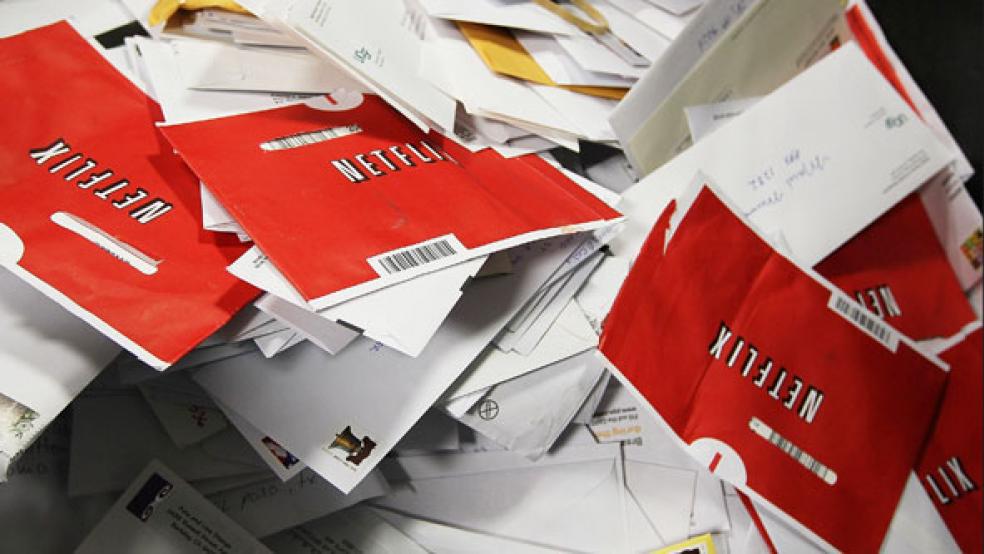Movie-rental giant Netflix Inc. surprised subscribers on Tuesday by announcing a new pricing scheme that will charge some customers as much as 60 percent more a month. The company said it would stop offering its $9.99 monthly combination plan that let users stream an unlimited number of movies and rent one DVD at a time by mail. Instead, Netflix is separating those options so subscribers will have to pay $7.99 for unlimited streaming and another $7.99 to get one DVD at a time.
Under the new pricing, customers who prefer to get two DVDs at a time along with Internet streaming will pay 33 percent more, while those who opt for three DVDs and streaming will face a 20 percent hike. The changes take effect immediately for new customers and on September 1 for existing subscribers.
Since its founding in 1997, Netflix has grown its membership rolls to more than 23 million and has sent out more than 3 billion DVDs in its signature red envelopes. Netflix insists that DVD business is far from dead, despite the higher costs associated with postage and keeping discs in inventory. “Given the long life we think DVDs by mail will have, treating DVDs as a $2 add on to our unlimited streaming plan neither makes great financial sense nor satisfies people who just want DVDs,” Netflix marketing VP Jessie Becker wrote on the company blog.
In recent years, though, CEO Reed Hastings has made clear that the company’s future lies in streaming movies rather than mailing them out. The new pricing seems intended to hasten that transition. “Essentially, Netflix is making people decide if they really want DVDs as part of their streaming subscription and if they do, requiring them to pay nearly $6 more for it per month,” writes Frost & Sullivan analyst Dan Rayburn.
That switch to streaming is proving to be expensive for Netflix. The company must still expand its online library, which reportedly includes some 20,000 titles, compared with some 120,000 on DVD and Blu-ray discs. At the same time, movie licensing costs are expected to skyrocket. As companies such as Amazon, Google, and Hulu vie for market share in the streaming business, movie and television studios are capitalizing on the competition by demanding higher licensing fees for their titles. Just last month, hundreds of Sony titles disappeared from Netflix’s streaming service as a result of what the movie-rental company termed a “temporary contract issue” between the studio and a cable network that licenses its movie catalog. Analysts expect it will become significantly more expensive for Netflix to keep streaming Hollywood’s top blockbusters. And Netflix’s recently announced plans to expand streaming to 43 countries throughout Latin America and the Caribbean will also require additional spending.
“This is a bad move on Netflix's part, but one that's not surprising as they look for ways to generate more revenue,” writes Rayburn. “With their licensing costs skyrocketing and the company aggressively pursuing more content deals for their expansion into Latin America, Netflix is feeling the pressure.”
The price hike is a risky response. Customers upset by the new scheme—Netflix’s second price increase in eight months—poured out their anger in thousands of comments on the Netflix blog and Facebook page, with some threatening to cancel their subscriptions or switch to services such as Hulu for streaming and Redbox for DVD rentals. The price change could also backfire, Rayburn suggests, if members who had been paying $9.99 a month switch to a streaming-only plan that costs $7.99 a month. Rayburn himself plans to do just that. “Now, when I want a DVD, I'll simply go to Redbox and get it for $1 a night. Forcing customers to go somewhere else for DVD rentals, when even Netflix admits there is still a demand for them, really isn't a smart move.”
More about the movie industry from The Fiscal Times:
7 Classic Business Movies Every Entrepreneur Should Watch
A Messy Fight Ahead for Netflix, TV Titans
8 Ways You Fund the Film Industry





